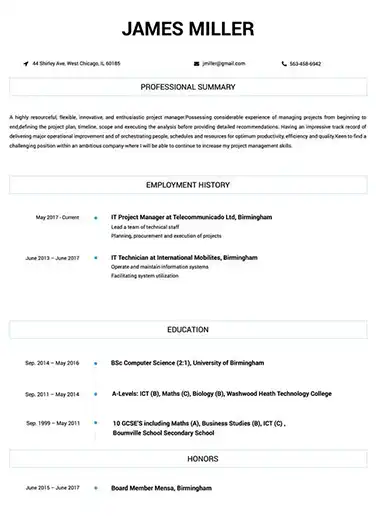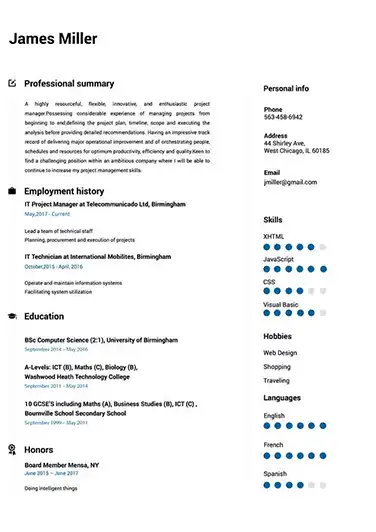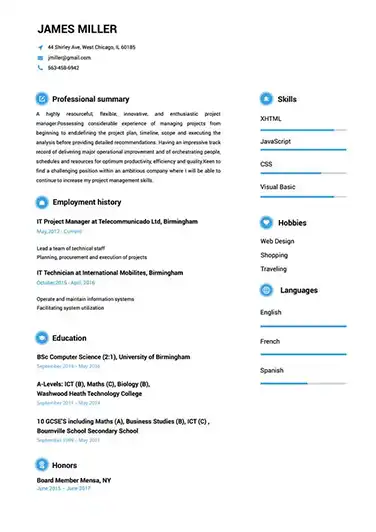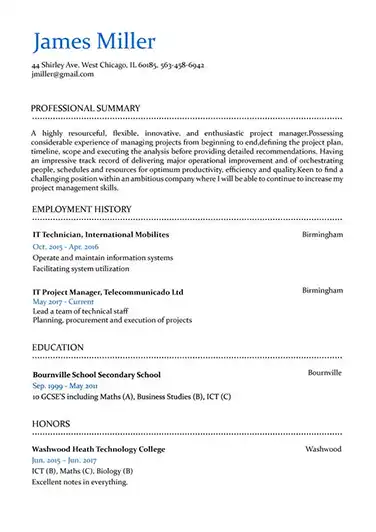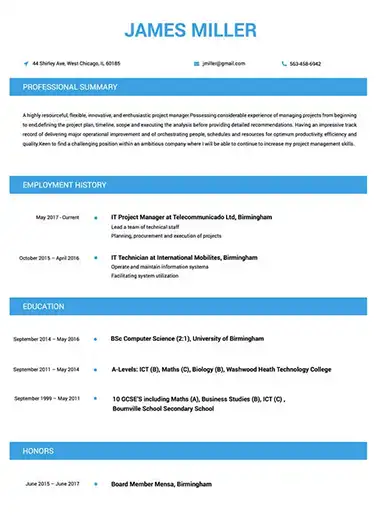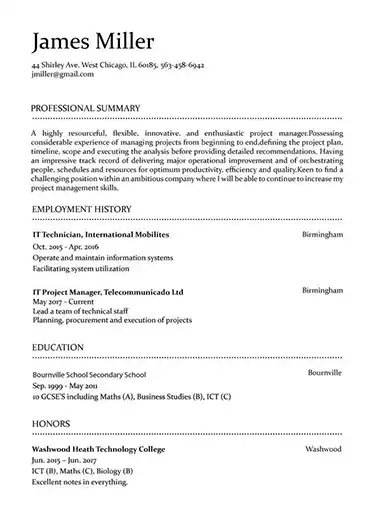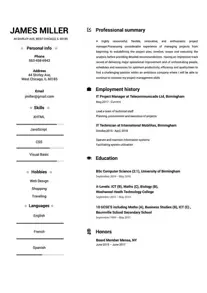 Use This Template
Use This Template
Build your resume in 15 minutes
Create an awesome resume that meets the expectations of potential employers with our selection of professional, field-tested resume templates.
bookkeeper: Resume Samples & Writing Guide
ceciljohnson@zoho.com
905-242-3301
Professional Summary
Employment history
- Reconcile accounts and maintain ledgers
- Provide administrative support to the accounting department
- Prepare financial statements and reports
- Generate financial reports and summaries
- Prepare and submit tax returns
- Assist with budget preparation and forecasting
- Maintain financial records and documents
- Ensure compliance with relevant regulations and laws
- Manage bank reconciliations
Education
Skills
Do you already have a resume? Use our PDF converter and edit your resume.
nathancampbell43@inbox.com
985-727-3386
Employment history
- Prepare and submit tax returns
- Assist with budget preparation and forecasting
- Monitor and review financial transactions
- Prepare and submit tax returns
- Prepare financial statements and reports
- Maintain and update general ledger
- Provide administrative support to the accounting department
- Manage bank reconciliations
- Prepare financial statements and reports
Education
Skills
benquinn42@mail.com
865-141-4068
Employment history
- Prepare and submit tax returns
- Monitor and review financial transactions
- Prepare financial statements and reports
- Monitor and review financial transactions
- Reconcile accounts and maintain ledgers
- Participate in audits and provide support
- Monitor and review financial transactions
- Prepare financial statements and reports
- Reconcile accounts and maintain ledgers
Education
Skills
bailey-evan@mail.com
825-913-5357
Employment history
- Prepare and submit tax returns
- Participate in audits and provide support
- Ensure compliance with relevant regulations and laws
- Prepare and submit tax returns
- Prepare and process accounts payable/receivable
- Prepare and process payroll
- Prepare financial statements and reports
- Maintain and update general ledger
- Monitor and review financial transactions
Education
Skills
irving-coleman@protonmail.com
922-912-8101
Employment history
- Manage bank reconciliations
- Participate in audits and provide support
- Reconcile accounts and maintain ledgers
- Monitor and review financial transactions
- Generate financial reports and summaries
- Prepare and submit tax returns
- Participate in audits and provide support
- Prepare and process payroll
- Manage bank reconciliations
Education
Skills
Not in love with this template? Browse our full library of resume templates
Bookkeepers are an invaluable part of many businesses. They are responsible for processing, recording, and keeping track of a business’ financial accounts, among other duties. These records may relate to a range of matters including bills, purchases, payroll, and more.
The reason bookkeepers are so vital is because they help ensure that a business’ records are all in order. Once a bookkeeper has made a record of all vital accounts, an accountant or the business owner themselves can review them and use the information to create financial reports, financial models, and other insightful resources.
But while bookkeepers, no doubt, provide significant support to businesses, it’s worth keeping in mind that the Bureau of Labor Statistics projects employment of bookkeeping clerks (along with accounting and auditing clerks) will decline by 4 percent from 2018 to 2028.
If you’re thinking that represents quite a significant drop, you’re unfortunately right. With a growing number of businesses making use of increasingly advanced bookkeeping tools and software, the demand for bookkeepers is decreasing.
However, that doesn’t mean you should pack it in! While it’s undeniable that securing a job in the industry is becoming more competitive, getting your resume in order will ensure that your career is on track for years to come.
After all, a recruiter will primarily judge your suitability for a given job based on the quality of your resume. The more impressive your resume is, the more likely they’ll hire you - it’s as simple as that.
Whether you’ve already started searching for a new job or are looking for tips to strengthen your resume, you’ll find all the answers you’re after in our bookkeeper resume guide. We’ve compiled our best insider resume tips and tricks in one handy resource so you can learn:
- What qualities recruiters for bookkeepers are after
- The most effective way to showcase your skill set
- How to transform your resume objective or summary from bland to eye-catching
- Tips for making a persuasive resume, even if you’re an entry-level candidate
- How to make your resume in just minutes (instead of several days!)
1. Multiple Template Examples
2. How to Write an Eye-Catching Bookkeeper Resume
How to format it
The format you choose for your bookkeeper resume will influence how a recruiter perceives your entire application. That’s why it’s vital to select the right one for your circumstances.
For example, a functional resume format is designed for candidates with little or no experience. It best supports the needs of entry-level candidates, because it emphasizes their skills over their professional experiences (or lack thereof).
However, if you’re an experienced bookkeeper, it is advisable to select a resume format that positions your professional achievements front and center. The one that does this most effectively is a reverse-chronological format. It orders your professional experiences from most to least recent, so a recruiter can easily grasp your career development.
Another factor that will shape a recruiter’s perception of you is the layout you select for your resume. It’s strongly advised that you stick with standard practices, of which we’ve outlined below:
- Number of Pages: Your resume must invariably fit on a singular page.
- Fonts to Use: Simple fonts that let your work speak for itself, such as Arial and Calibri.
- Fonts to Avoid: Overly stylized fonts such as Pinyon Script and Pacifico.
- Margins: 1 inch on all sides.
- Line Spacing: 1 or 1.15.
- Header size: 14-16 point size.
- Text size: 11-12 point size
What are the most important sections to include in your resume?
While every candidate’s resume should be unique, there are some set rules in place that apply across the board. In addition to the formatting and layout guidelines we touched on above, you should also stick to the standard resume sections recruiters are expecting to see. We’ve outlined the most important sections to include in your bookkeeper resume below:
- Contact information: Below your resume heading, you should list your contact information. Be sure to include your phone number, email address, home address, and a link to your LinkedIn profile.
- Resume objective or resume summary: A short paragraph that aims to introduce yourself to the recruiter and convince them why you’re the best bookkeeper for the job.
- Education: The most important details about your educational background, including the institutions you attended, any degrees you hold, and the years you studied.
- Training and certifications: A list of any training and certifications you have undertaken that are relevant to the position you’re applying to.
- Professional experience: An overview of your most notable achievements in each relevant job you have held.
- Skills: A list of 6 to 8 of the most relevant soft and hard skills you offer as a bookkeeper.
What recruiters will look for?
Recruiters are looking for bookkeepers who are able to demonstrate a strong command of the ins and outs of bookkeeping. While an ideal candidate does not necessarily need to have post secondary qualifications, recruiters tend to look favorably on candidates who have completed relevant studies. Most have also been known to give strong preference to bookkeepers who are professionally certified, but this is not a given as this is dependent on the requirements of each job.
Moreover, recruiters are searching for candidates who boast the right job-specific hard skills needed to efficiently and accurately complete their work in line with an employer’s expectations. However, they will expect these candidates to additionally possess the soft skills needed to positively communicate and collaborate with other employees.
So how do you communicate to a recruiter that you represent everything (or nearly everything) they’re looking for in an ideal candidate? You guessed it - you need to convey it via your resume.
How to list additional certifications and training?
Unless you have an accounting or mathematics degree, your certifications and training will arguably be more important to a recruiter than your post secondary qualifications. This is why it’s vital that you feature any additional certifications and training you have prominently in your resume.
The most vital certification a bookkeeper can hold is a Certified Public Bookkeeper (CPB) certification from the National Association of Certified Public Bookkeepers (NACPB) or the American Institute of Professional Bookkeepers (AIPB). While not mandatory, it is wise to get your CPB certification, because many recruiters are only looking to hire certified bookkeepers. Even if it is not a requirement for a role, being a certified bookkeeper will give you a competitive edge.
If you are a CPB, feature this fact at the top of your “Certifications and Training” section. You can list this certification by stating:
- The name of the certification or training
- The name of the organization who issued it
- The year you obtained it
For example:
- Certified Public Bookkeeper, NACPB, 2020
Or
- Certified Public Bookkeeper, AIPB, 2020
Pro tip: If the organization who issued your certification or training has a recognizable acronym, you can use this, instead of writing out their name in full.
You can also use the format above to list any other relevant certifications and training you have to your name. Here are some examples of bookkeeper training and certifications that are sure to catch a recruiter’s eye:
- Accounting Fundamentals Training (NACPB)
- Avalara Training (Avalara) *
- Accounting Analysis Training (NACPB)
- Bookkeeping for Small Businesses Training (NACPB)
- Bookkeeping Training Program (U.S. Career Institute)
- Expensify Certification (Expensify) *
- Professional Bookkeeping Certification (Illumeo)
- QuickBooks Certification (QuickBooks) *
* These bookkeeping software companies offer free online training courses for their products. So if your Training and Certifications section is looking a bit bare, you can complete one of these courses and add it in!
What skills to mention and how to do it correctly (including how to quantify your skills and why that’s important)?
Your unique skill set as a bookkeeper is part of what makes you an indispensable employee in the workplace. It’s also what can put you on a recruiter’s radar, so long as you mention the right ones in the right way in your resume.
Picking the most appropriate skills to mention shouldn’t be a guessing game. We recommend that you instead take a careful look at each job ad to discover the specific skills recruiter is looking for in their ideal candidate. They will use specific words, referred to as keywords, in the job ad to highlight the skills and other qualities they value.
If you feature these same skills throughout your resume, you will in effect align yourself with a recruiter’s vision of a perfect candidate!
Be mindful that a recruiter will be looking for both technical skills (referred to as “hard skills”) and interpersonal, communication-based skills (referred to as “soft skills”).
To make this distinction clear, we’ve listed out the top 10 hard and soft skills recruiters mentioned in the real-life job ads we analyzed:
Soft skills
- Detail-oriented
- Ability to work at a fast pace,
- Keen eye for detail
- Efficiency
- Organizational skills
- Open and honest communication
- Communicate effectively with coworkers
- Self-motivated
- Ability to follow through on verbal and written directions
- Integrity
Hard skills
- Reporting sales, deposits, receipts, crediting of funds
- Paying bills and maintain ledgers
- Receiving, approving, and/or declining invoices
- Reconciling bank accounts
- File maintenance
- Payroll processing
- Avalara proficiency
- Expensify proficiency
- Excel proficiency
- Mathematics skills
Once you have pinpointed which of the skills in the job ad match up with your own skill set, you can work on adding them to your resume. (Needless to say, in order to include the skills you find in a job ad, you will actually need to possess them in the first place. It’s fine if you don’t have them all, but the more you do, the stronger your application will be).
Firstly, you will need to add 6 to 8 of them in a “Skills” section. You should only list them out here, but you will need to expand on them in your work experience section. It’s vital to also feature your skills throughout this section, because doing so lets you showcase to the recruiter how you used them to excel in your current and previous companies.
After all, a recruiter essentially wants to know that you can effectively use the skills you claim to have, so your work experience section is the perfect place to make this clear.
So how do you include relevant skills in your work experience section? Let’s start off by first discussing what not to do. Take a look at the following work achievement a candidate wrote to target the skills-based keyword “maintain ledgers”:
- Regularly maintained ledgers
The problem with this achievement is that it doesn’t tell the recruiter about how the candidate’s maintenance of the ledgers made a positive contribution to their company.
Let’s now take a look at a work achievement from a candidate who was much more successful in targeting this very same keyword:
- Regularly maintained ledgers for accuracy, resulting in the identification of a 500% discrepancy in funds that was resolved thanks to my input.
We think you’ll agree that this candidate knocks it out of the park! But why exactly does their achievement sound so incredible? It’s all because they quantify the impact that their skill had. Instead of just stating what their skill is (like the previous candidate did), they have made it crystal clear why their skill was so invaluable to the company.
Any good bookkeeper can maintain ledgers. But only the most skilled ones can pick up when something is amiss, like this candidate did.
If you need further convincing about why quantifying your skills is so important, put yourself in the recruiter’s shoes. Would you rather hire:
- A candidate who says they have particular skills?
Or
- A candidate who backs up the skills they claim to have by quantifying them with examples?
The answer is obvious. That’s why if you want to leave the right impression with recruiters, it’s essential to quantify any skills you mention in your achievements section.
Pro tip: You will quickly become a keyword spotting pro once you familiarize yourself with job ads for bookkeepers. We recommend spending some time browsing through them until you begin to notice the same keywords being used. While no two bookkeeper positions are the same, the general skills recruiters are looking for are often similar. This makes identifying which ones you need easy with a bit of practice!
How to write a resume objective? And examples of this
A resume objective is a 2 to 4 sentence overview that communicates to the recruiter why you’re worth hiring, despite the fact that you have little to no experience.
However, to get it right, it is vital that you don’t place too much emphasis on the fact that you’re lacking experience, like this candidate did:
- Recent high school graduate without any bookkeeping experience or skills who is searching for any opportunity to break into the industry. I will do absolutely any bookkeeping tasks you have if you give me a chance.
As soon as a recruiter reads this candidate’s resume objective, there’s next to no chance they’ll continue reading the rest of their resume. After all, the candidate stated that they don’t offer any bookkeeping experience or skills!
While they may indeed lack professional experience, we imagine they can at least highlight a few relevant skills they possess! For example, they’ll likely have a number of soft skills bookkeepers need, such as being organized, meticulous, and competent at written and oral communication. They may even have some hard skills a recruiter would be looking for, such as Excel skills.
Another faux pas this candidate made is that they show their desperation for getting the job. While we understand they really want the job, desperation is never a good look on a resume. Instead, when writing your resume objective, you should show a good level of self confidence in the qualities you can offer the recruiter, as this candidate did:
- Recent high school graduate who is currently completing an online course about bookkeeping fundamentals is seeking an opportunity to work at Digits Plus Accounting. With a strong skill set including diligence, a keen eye for detail, and high-level mathematics, I believe I would be a suitable fit for the Entry-Level Bookkeeper position. Trained in QuickBooks and Avalara.
Unlike the previous candidate, this candidate offers the recruiter plenty of reasons to pay attention to their application. Not only do they highlight the relevant soft and hard skills they already possess, but they also draw attention to the bookkeeping skills and knowledge that they’re making an effort to develop.
A recruiter would definitely be eager to learn more about them, given that they’re currently completing a relevant online course and they’ve already completed two others. While the candidate doesn't have bookkeeping experience in a professional setting, the recruiter would recognize their strong potential thanks to their proactiveness and ever-growing skill set.
As you can see, there are a number of things you can do to piece together an eye-catching resume objective, even without an ounce of professional experience!
How to write a resume summary and examples of this
The purpose of a resume summary is to present the recruiter with a convincing case about your worthiness as a candidate. While it is the same length as a resume objective, it should only be used by experienced bookkeepers.
As you can imagine, there are certain do’s and don’ts to keep in mind when writing yours. For example, don’t make the same mistakes the following candidate did:
- Part-time certified bookkeeper with 4+ years of experience who wants to transition into a full-time role. I have a variety of bookkeeping skills to offer and am sure I will be a welcome addition to the Vandelay Industries team.
At the heart of what’s wrong with this resume summary is the fact that the candidate failed to provide the recruiter with a single reason to hire them. They’ve confidently written that they would make “a welcome addition to the Vandelay Industries team,” but didn’t offer any supporting evidence to show this.
What’s more, the candidate only made general claims about their supposed bookkeeping skills, and provided zero information to distinguish themselves from other candidates. All of this would lead a recruiter to quickly hit the “delete” button.
Let’s now take a look at an example of a bookkeeper resume summary that ticks all the boxes:
- Part-time certified bookkeeper with 4+ years of experience who is known for their high level of accuracy and efficiency. As a full-time bookkeeper at Vandelay Industries, I plan to leverage my strong command of Xero to process payroll correctly each and every time. Recently awarded Employee of the Month at my current workplace, thanks to my diligence, positive attitude, and second-to-none ability to crunch numbers.
This candidate set themselves up for success by stating from the get-go which relevant skills they offer as a bookkeeper. Unlike the previous candidate, they provided the recruiter with a convincing explanation as to why they’ll be a welcome addition to Vandelay Industries. That is, the candidate shares their plans to use their skills (i.e. accuracy, efficiency, and competency in Xero) to achieve the goals the recruiter has in mind for this role (i.e. correctly processing payroll each and every time).
Another reason this resume summary is so strong is because it goes up and beyond what the recruiter is expecting to see. The candidate is aware that many other candidates will also offer similar skills and competencies, so they know how vital it is to offer something extra to capture their attention. This is why their Employee of the Month award is the perfect additional inclusion to what was an already fantastic resume summary.
As you can see, writing a winning resume summary isn’t rocket science. Just follow the approach this candidate took, you’ll be on your way to writing a similarly eye-grabbing one.
How to write a bookkeeper resume when you have limited or no experience
Writing a bookkeeper resume when you’ve been in the industry for several years is challenging enough, let alone if you only have limited or no experience. In order to write a strong entry-level bookkeeper resume, you should keep the following suggestions in mind:
- Use the right resume format: As we mentioned in the formatting section of this guide, there are different resume formats to suit different circumstances. While you’re welcome to try your luck using a reverse-chronological format, keep in mind that it will show you lack of experience loud and clear.
That’s why we advise entry-level candidates to use a functional resume format. It’s designed to make your skills stand out over your limited experience, so you appear to be a highly-skilled candidate, instead of an inexperienced one.
- Work on your Training and Certifications section: Imagine if your Training and Certifications section on your resume was packed, even before you got your first job. You can trust that a recruiter would be positively surprised! The beauty of bookkeeping is that you start developing your knowledge and skills right now from the convenience of your home.
There are plenty of free online courses that will help you familiarize yourself with the fundamentals of bookkeeping and/or common bookkeeping software. We’ve shared a few above that you can get started on without spending a dime.
- Seek out opportunities to gain professional experience: It’s the ultimate conundrum for entry-level bookkeepers: How do you gain experience if you don't have any in the first place? The good news is there are plenty of ways you can if you’re smart about it!
While a bookkeeper internship is always ideal, you can also offer to fix up the books at your parents’ or family friend’s business, volunteer your bookkeeping skills at a charitable organization, or put the call out offering your services for free or a small fee. Once you have a bit of experience to your name, you’ll soon find it far easier to get even more.
How to make your resume stand out?
If you’re determined to wow recruiters, you will need to give your resume an edge over the competition. We’ve shared our tried-and-tested tips below for making your bookkeeper resume stand out:
- Choose the right verbs: When it comes time to write about your current and past achievements as a bookkeeper, wording is everything. The right wording can make even a lackluster sentence sound remarkable, while the wrong wording can make your most amazing achievement fall flat.
One of the most important words to get right is the very first one in each bullet point of your work achievements section. Instead of using the same tired and uninspiring verbs, opt for “power words”. These are engaging verbs that encourage the recruiter to pay attention. If you’re after some ideas of which ones to use, check out this list of 185 eye-catching power words.
- Understand how ATS works: You may be a whiz at bookkeeping software, but we’re guessing that you may not have come across a special HR software called Applicant Tracking System (ATS). This popularly-used tool helps recruiters to sort through resumes based on the presence or absence of certain keywords.
If the keywords are absent in your resume, ATS won’t pass it. This is why we can’t urge you enough to follow the advice we shared above about including keywords from a job ad in your resume.
- Customize it for every job: A guaranteed way to stand out from other candidates is to customize your resume for each and every job you apply for. Recruiters can spot in a millisecond which resumes are generic and which are customized to address the criteria in their job ad. And trust us, we know from experience that if you hand in the same resume every time, your chances of passing into the interview stage are close to 0.
While it does take time to tweak your resume for each application, the payoff is huge (i.e. scoring your dream job!). If you want to apply for a ton of jobs, but don’t have time to customize your resume each time, we recommend taking a good read of the next section.
3. How You Can Use Resumebuild.com’s Resume Builder Tool to Easily Make Your Bookkeeper Resume
How are you feeling after reading our bookkeeper resume guide? While you may be one of the few who’s now pumped to dedicate days of your free time to perfecting your resume, we’re guessing that it’s more likely that you’re overwhelmed by the thought of doing so.
Submitting a professional bookkeeper resume is vital, but that doesn’t mean you need to start with a blank page. If you use Resumebuild’s cutting-edge resume builder tool, you’ll be able to get a head start with one of our stunning pre-loaded resume templates. This will not only save you tons of time, but also allow you to create a professional-looking resume that recruiters and the ATS will both approve of.
With your resume’s formatting and layout sorted, you’ll be able to concentrate on the contents of it. Our resume builder breaks down the writing process into digestible steps that make writing each section as easy as possible. If writing isn’t your forte, you can always take advantage of the pre-written examples for bookkeepers provided within the builder.
If you’re ready to show recruiters what you’re made of as a bookkeeper, get working on your resume with our DIY resume builder.
bookkeeper Job Descriptions; Explained
If you're applying for an bookkeeper position, it's important to tailor your resume to the specific job requirements in order to differentiate yourself from other candidates. Including accurate and relevant information that directly aligns with the job description can greatly increase your chances of securing an interview with potential employers.
When crafting your resume, be sure to use action verbs and a clear, concise format to highlight your relevant skills and experience. Remember, the job description is your first opportunity to make an impression on recruiters, so pay close attention to the details and make sure you're presenting yourself in the best possible light.
bookkeeper/ junior staff accountant
- Created periodic reports comparing past costs to current year costs.
- Debit, credit, and total accounts on computer spreadsheets (Microsoft Excel) and databases, using specialized accounting programs (Caseware, Receipt Bank, Auto-Entry, Hubdoc).
- Prepare incorporation documents along with minute book for newly incorporated documents.
- Responsible for all cash in and out transactions of the branch as well as all Accounting and Bookkeeping concerns
bookkeeper
- Worked on Monthly Financial Statements with Accompanying Work Papers.
- Generated Monthly Income Statements, Balance Sheets and Trial Balances.
- Accounts Payable and Accounts Receivable Duties.
- Monthly Bank and Credit Card Reconciliations.
- Preparation of Weekly Cash Flow Spreadsheets and Journal Entries.
bookkeeper
- Hire employees and process hirin
- Collect, count, and disburse money, do basic bookkeeping, and complete banking transactions.g-related paperwork.
- Encoding of clients data in the system
- Assisting Account Officers for clients status concerns
bookkeeper
- Performs basic bookkeeping and accounting procedures
- Process Credit Recovery
- Process kinds of documentation
- Paid monthly and yearly taxes
bookkeeper
- Posted patient payments
- Processed daily deposits
- Maintained and reconciled patient fund accounts
- Assisted patients and/or families with account questions
- Assisted business manager with various duties
- Answered phones and directed calls to appropriate personnel
- Assisted residents and families with patient fund requests
bookkeeper/ junior staff accountant Job Skills
For an bookkeeper/ junior staff accountant position, your job skills are a key factor in demonstrating your value to the company and showing recruiters that you're the ight fit for the role. It's important to be specific when highlighting your skills and ensure that they are directly aligned with the job requirements, as this can greatly improve your chances of being hired. By showcasing your relevant skills and experience, you can make a compelling case for why you're the best candidate for the job.
How to include technical skills in your resume:
Technical skills are a set of specialized abilities and knowledge required to perform a particular job
effectively. Some examples of technical skills are data analysis, project management, software proficiency,
and programming languages, to name a few.
Add the technical skills that will get hired in your career
field with our simple-to-use resume builder. Select your desired resume template, once you reach the skills
section of the builder, manually write in the skill or simply click on "Add more skills". This will
automatically generate the best skills for your career field, choose your skill level, and hit "Save &
Next."
- Data Entry
- Bookkeeping
- QuickBooks
- Accounts Payable
- Accounts Receivable
- Payroll Processing
- Bank Reconciliations
- Financial Statements
- Tax Preparation
- Auditing
- Budgeting
- Forecasting
- Cost Accounting
- Financial Analysis
- Inventory Management
- Microsoft Office
- Excel
- Cash Flow Management
- Reconciliation
- General Ledger.
How to include soft skills in your resume:
Soft skills are non-technical skills that relate to how you work and that can be used in any job. Including
soft skills such as time management, creative thinking, teamwork, and conflict resolution demonstrate your
problem-solving abilities and show that you navigate challenges and changes in the workplace
efficiently.
Add competitive soft skills to make your resume stand-out to recruiters! Simply select
your preferred resume template in the skills section, enter the skills manually or use the "Add more skills"
option. Our resume builder will generate the most relevant soft skills for your career path. Choose your
proficiency level for each skill, and then click "Save & Next" to proceed to the next section.
- Communication
- Interpersonal
- Leadership
- Time Management
- Problem Solving
- Decision Making
- Critical Thinking
- Creativity
- Adaptability
- Teamwork
- Organization
- Planning
- Public Speaking
- Negotiation
- Conflict Resolution
- Research
- Analytical
- Attention to Detail
- Self-Motivation
- Stress Management
- Collaboration
- Coaching
- Mentoring
- Listening
- Networking
- Strategic Thinking
- Negotiation
- Emotional Intelligence
- Adaptability
- Flexibility
- Reliability
- Professionalism
- Computer Literacy
- Technical
- Data Analysis
- Project Management
- Customer Service
- Presentation
- Written Communication
- Social Media
- Troubleshooting
- Quality Assurance
- Collaboration
- Supervisory
- Risk Management
- Database Management
- Training
- Innovation
- Documentation
- Accounting
- Financial Management
- Visualization
- Reporting
- Business Acumen
- Process Improvement
- Documentation
- Relationship Management.
How to Improve Your bookkeeper/ junior staff accountant Resume
Navigating resume pitfalls can mean the difference between landing an interview or not. Missing job descriptions or unexplained work history gaps can cause recruiters to hesitate. Let's not even talk about the impact of bad grammar, and forgetting your contact info could leave your potential employer hanging. Aim to be comprehensive, concise, and accurate.
evans.charles@aol.com
923-723-1913
Employment history
- Prepare financial statements and reports
- Monitor and review financial transactions
- Manage bank reconciliations
- Generate financial reports and summaries
- Prepare financial statements and reports
- Provide administrative support to the accounting department
Education
Skills
Unexplained Year Gaps and Missing Job Experiences are a No-no
Gaps in your resume can prevent recruiters from hiring you if you don't explain them.
Key Insights- It's okay to have gaps in your work experience but always offer a valid explanation instead of just hiding it.
- Use the gap to talk about positive attributes or additional skills you've learned.
- Be honest and straightforward about the gap and explain it using a professional summary.
How to Optimize Your bookkeeper/ junior staff accountant Resume
Keep an eye out for these resume traps. Neglecting to detail your job roles or explain gaps in your career can lead to unnecessary doubts. Grammar blunders can reflect negatively on you, and without contact information, how can employers reach you? Be meticulous and complete.
Employment history
- Mointor and review finacial transactions
- Prepare and proccess accounts payabel/recievable
- Ensure comliance with relevent regulations and laws.
Education
Skills
Avoid Spelling Mistakes and Include your Contact Information
Missing contact information prevents recruiters from understanding you're the best fit for the position.
Key Insights- Make sure you're not missing contact information on your resume. That should include your full name, telephone number and email address.
- Make sure to use a professional email address as part of your contact information.
- Highlight your contact information and double check that everything is accurate to help recruiters get in touch with you.
bookkeeper/ junior staff accountant Cover Letter Example
A cover letter can be a valuable addition to your job application when applying for an bookkeeper/ junior staff accountant position. Cover letters provide a concise summary of your qualifications, skills, and experience, also it also gives you an opportunity to explain why you're the best fit for the job. Crafting a cover letter that showcases your relevant experience and enthusiasm for the Accounts Payable role can significantly improve your chances of securing an interview.
Johnson ceciljohnson@zoho.com
905-242-3301
830 Country Lane, South La Paloma, TX
78372
BDO USA
Chicago, Illinois
BDO USA Hiring Team
As a Bookkeeper with a proven track record of success in Accounting & Auditing, I am excited to apply for the Senior Bookkeeper position at BDO USA. I believe that my skills and expertise would make a valuable contribution to your team.
As someone who has always been committed to making a positive impact on the world, I have pursued opportunities to contribute to my community through my work wherever I may be. My experience in this field has equipped me with the skills and knowledge necessary to succeed throughout my life and I am confident that they will help me to bring my passion and expertise to your organization and help drive your success.
Thank you for considering my application for the Senior Bookkeeper role. I am very passionate about this field and possess a deep understanding of the industry so, I am thrilled about the opportunity to contribute to your organization's success.
Your time is appreciated,
Cecil Johnson
905-242-3301
ceciljohnson@zoho.com
Cecil Johnson
Showcase your most significant accomplishments and qualifications with this cover
letter.
Personalize this cover letter in just few minutes with our user-friendly tool!
Related Resumes & Cover Letters

Build your Resume in 15 minutes
Create an awesome resume that meets the expectations of potential employers with our selection of professional, field-tested resume templates.

